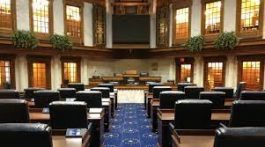The Indianapolis City-County Council passed Mayor Joe Hogsett’s $1.7 billion 2026 budget Monday night — and if you heard the rhetoric afterward, you’d think we just watched two entirely different meetings.
On paper, the city now has its ninth consecutive balanced budget with no “tax increases.” In practice, it passed along party lines, 17–8, after Democrats cut off debate and Republicans stormed out angry about what they called censorship, fuzzy math, and “smoke and mirrors.”
Council President Vop Osili and Majority Leader Maggie Lewis framed the budget as a model of “fiscal responsibility and strategic investment.” They touted $70 million for road repairs, 40,000 potholes slated for patching, and more than $10 million in housing and homelessness programs. Public safety funding stays flat with 1,743 police officers, 1,276 firefighters, and continued investment in the Clinician-Led Community Response team. Lewis also highlighted $11.7 million for homelessness reduction and $8.5 million for construction of Fire Station 33.
The majority’s talking point: nine straight balanced budgets with no tax increases and no sale of public assets. That’s technically true — if you don’t count the rising fees and fines tucked inside the fiscal package.
Republicans Cry Foul
The GOP caucus voted unanimously against the budget, calling it another round of “rubber-stamped failure.” Their press release blasted the Hogsett administration for underfunding basic services and ignoring “core responsibilities” like new police vehicles and infrastructure.
Minority Leader Brian Mowery was more colorful after the vote. “I’m absolutely enraged,” he told Indy Politics. “They silenced so many voices by calling the question. Even as minority leader I didn’t get to speak. It was disgusting censorship.”
Mowery also jabbed the mayor’s team for “punting down Market Street” — blaming the state for property-tax shortfalls instead of cutting what he called “pet projects.” He acknowledged that DMD fees were being raised but argued some were long overdue: “If it slows down some of these overnight developments in my district, I’m fine with that.”
As for the Democrats’ no-tax claim? “They can play word games all they want,” Mowery said. “Fees, fines, penalties — that’s money out of people’s pockets. It’s just not called a tax.”
Tight Money, Tight Tempers
Even some Democrats admitted this wasn’t the budget of their dreams. Councilors Jared Evans and Dan Boots told reporters that with $43 million in revenue losses from state property-tax changes and Eskenazi funding cuts, “nobody was going to be happy.” A small working group met weekly with the administration since March to shape the numbers. “We did our best,” Evans said, “but it was never going to be beautiful.”
Looking Ahead
Next year’s budget is expected to be even tougher, with new property-tax caps and Senate Bill 1 squeezing local revenues. Both sides agree something will have to give — they just disagree on whether to cut, raise, or “reimagine” spending.
And because it’s Indy, the night ended with a little ideological theater. Socialist Councilor Jesse Brown floated the idea of the city buying out AES Indiana to control electric rates — a concept that might play well on Twitter but carries a potential $3–5 billion price tag. Minority Leader Mowery’s response was quick: “If it costs $11 billion, that math doesn’t work.”










